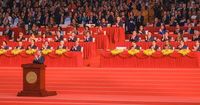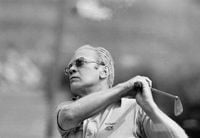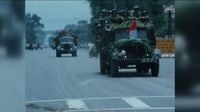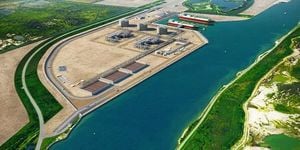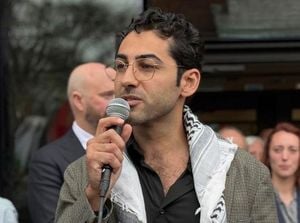HO CHI MINH CITY, Vietnam — On April 30, 2025, Vietnam marked the 50th anniversary of the end of the Vietnam War with a vibrant military parade in Ho Chi Minh City, celebrating what the country’s Communist leader called a "victory of faith" and a testament to national unity. The fall of Saigon, which took place on this day in 1975, ended a long and devastating conflict that resulted in the deaths of approximately 3 million Vietnamese and nearly 60,000 Americans.
Thousands of citizens gathered to commemorate the occasion, with many camping out overnight to secure prime viewing spots along the parade route. The atmosphere was electric, as red flags waved proudly amidst the cheers of the crowd. "The atmosphere was very special," said 18-year-old Nguyen Thi Song Anh, who attended the event with her classmates. "It was important for me to feel part of this country — and part of this history."
To Lam, the general secretary of the Communist Party of Vietnam, delivered a speech that emphasized reconciliation and the need for a united Vietnam moving forward. "All Vietnamese are sons and daughters of this country," he stated, reiterating that everyone is entitled to live, work, and pursue happiness in Vietnam. He also called for the private sector to take a leading role in the nation’s economic development, reflecting a shift from previous state-centric policies.
The parade featured approximately 13,000 participants, including troops, veterans, and local citizens, and was marked by the presence of Chinese, Laotian, and Cambodian soldiers marching alongside Vietnamese formations for the first time. This inclusion highlighted the historical support Vietnam received during the war and the current geopolitical dynamics in the region. Helicopters and fighter jets performed flyovers, showcasing Vietnam’s military capabilities.
In a notable shift from past commemorations, the event focused more on unity and peace rather than military triumph. Nguyen Khac Giang, an analyst at Singapore’s ISEAS–Yusof Ishak Institute, noted that this reflects how Vietnam is adapting to changing global economic and geopolitical landscapes. He remarked, "The war still defines Vietnam’s unity, and its unresolved divides."
The celebrations also coincided with the 30th anniversary of diplomatic ties between Vietnam and the United States. However, tensions remain due to recent tariff threats from the Trump administration, which imposed a 46% tariff on Vietnamese goods. This has raised concerns about the future of the bilateral relationship and Vietnam’s export-dependent economy.
Despite these challenges, both nations have made strides toward improved relations, with U.S. Consul General Susan Burns attending the parade. This marked a softening of earlier directives discouraging U.S. diplomats from participating in the anniversary events. In contrast, U.S. Ambassador Marc E. Knapper did not attend, highlighting the ongoing complexities in U.S.-Vietnam relations.
As the parade unfolded, families sang patriotic songs, and the streets were filled with the sounds of celebration. Tran Quang Duc, a 67-year-old veteran who fought for the North, expressed pride in Vietnam’s development since the war, stating, "It’s so emotional to see all the development and changes happening in Vietnam. I don’t think anyone would want to fight Vietnam now. We’re strong and confident."
The event was not just a commemoration of past struggles but also a reflection of Vietnam’s aspirations for the future. To Lam outlined ambitious goals for the country, aiming for Vietnam to achieve a fully developed status by 2045, with a targeted economic growth rate of 8% or more for 2025. He underscored the importance of overcoming obstacles to achieve these goals.
As the day concluded, the scenes of celebration contrasted sharply with the memories of the war. Ho Chi Minh City, once a battleground, is now a bustling metropolis of 9 million people, filled with modern infrastructure and a youthful spirit. The presence of international guests, including former leaders from neighboring countries, underscored Vietnam's evolving role on the global stage.
Reflecting on the past and looking toward the future, the 50th anniversary of the fall of Saigon serves as a reminder of the resilience and determination of the Vietnamese people. As they celebrate their history, they also embrace the challenges and opportunities that lie ahead.
In summary, while the memories of the Vietnam War remain a significant part of the national narrative, Vietnam is poised to move forward, striving for economic growth, reconciliation, and a peaceful future.
